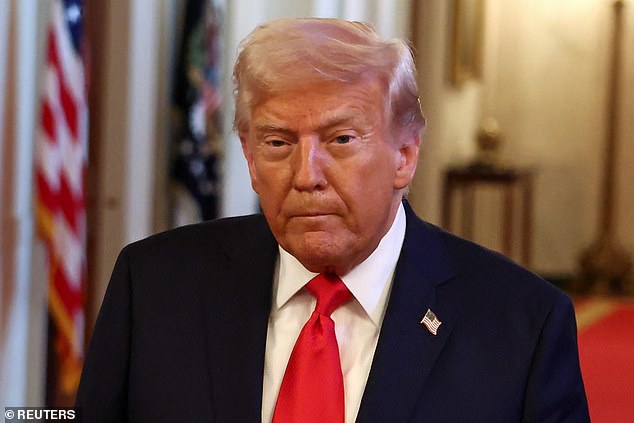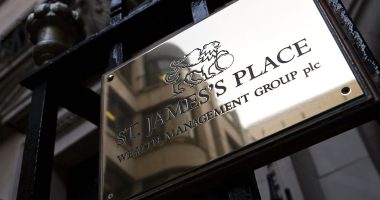Share this @internewscast.com
US Vice-President JD Vance’s optimism over a trade deal with Britain looks a rich prize. Nobody wants to be on the wrong side of Donald Trump’s tariff war.
It would be terrific for Chancellor Rachel Reeves if she were able to return from the International Monetary Fund in Washington next week clutching a ‘peace in our time’ deal.
The UK should not be starry-eyed about what is on the table. Escaping the overarching tariff of 10 per cent on our goods trade would be an enormous relief for, among others, Scotch whisky, which racked up £971million in exports last year.
It would be even more valuable to Jaguar Land Rover, BMW-owned Mini and other UK car makers who face a 25 per cent barrier and little manufacturing capacity in the US.
When it comes to British values, the country nevertheless must be careful what it wishes for.
Free speech advocates in America, led by the Gab social media network, want exemption from Ofcom’s Online Safety Act.

Uncertainty: U.S. President Donald Trump is in the process of setting new tariffs on imports to the US, sending the global economy and markets into turmoil
That’s all fine and dandy but it would leave Britain even more exposed to extreme political and racist views, and nullify steps taken by Silicon Valley to protect young people from unacceptable sexual content.
Sacrificing the digital services tax – set to raise up to £1billion for the Exchequer – might appear to be a small price to pay for tariff-free reciprocal trade.
The secondary consequences for Britain’s hard-pressed retailers, stuffed with higher National Insurance Contributions (NICs), rising business rates and the jump in the National Living Wage is less alluring.
Then there is the vexed question of Big Pharma’s £8.8billion medicinal exports to the US, where our biggest company AstraZeneca earns some 40 per cent of its income.
If life sciences fail to earn an exemption it could be catastrophic for UK plc. Farmers in America are pressing for access to UK and European markets for poultry and beef.
Business Secretary Jonathan Reynolds is adamant that Britain will not relax food standards.
Maybe. But if that were to be the only blockage to a comprehensive deal then even that might not be etched in stone.
The less-published costs of kowtowing to a Trumpian regime should not be brushed under the carpet.
Lost empire
The defenestration of Lord Weinstock’s leading-edge electronics and defence behemoth GEC by his successor George Simpson in the late 1990s counts as one of the biggest acts of self-harm in British corporate history.
It deprived the UK of a manufacturing champion, making everything from washing machines to advanced train systems and the brilliant electronics of Plessey.
All that was left after the sell-off and failed effort to dominate communications systems was telecoms minnow Telent and a vast pension fund many times the size of the company.
Financial bailout specialists JC Flowers bought Telent in the belief that it could extract value from the pension fund by running it better.
It was eventually sold to pensions buy-up outfit Rothesay Life. Now Telent, which provides telecoms services including Wi-Fi for London Transport, is being sold to M Group, an infrastructure firm pieced together by private equity barons CVC.
At a time when public markets are closed, and the buy-out industry is suffering a bad case of indigestion, the secondary market – selling assets to each other – has become commonplace.
Telent, sold for an estimated £275million, is a minnow. But the build-up of leverage and labyrinthine off-the-market deals is a worrying trend.
Green shoots
The last month gifted Rachel Reeves much-needed better economic data.
Unemployment may be creeping up but output in February rose 0.5 per cent, the dominant services sector is in expansion territory and inflation fell to 2.6 per cent in March.
All of this pre-dates the rise in employer NICs, Trump’s tariff mayhem and the correction on financial markets.
The prices data should ease anxiety on the Bank of England’s interest rate-setting monetary policy committee about cutting the rate from 4.5 per cent on May 8.
Markets suggest there could be four cuts this year. Chocks away!
DIY INVESTING PLATFORMS

AJ Bell

AJ Bell
Easy investing and ready-made portfolios

Hargreaves Lansdown

Hargreaves Lansdown
Free fund dealing and investment ideas

interactive investor

interactive investor
Flat-fee investing from £4.99 per month

Saxo

Saxo
Get £200 back in trading fees
Trading 212
Trading 212
Free dealing and no account fee
Affiliate links: If you take out a product This is Money may earn a commission. These deals are chosen by our editorial team, as we think they are worth highlighting. This does not affect our editorial independence.
Compare the best investing account for you

















